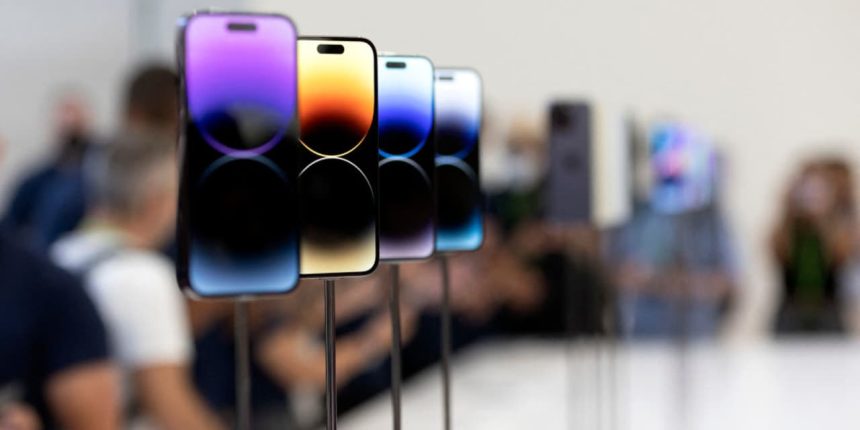The annual unveiling of Apple’s latest iPhone isn’t as exciting as it used to be.
Maybe that’s because we’re on the 15th iteration of a device that essentially does the same thing it did when the first one came out in 2007. It’s hard to get too pumped about a slightly better camera, slightly faster chip, or a new charging cable.
Perhaps it’s a bonus this time, as the Federal Reserve prepares to receive new consumer-price data on Wednesday, that the new model should feel like a bargain on an inflation-adjusted basis.
But none of that means this year’s announcement is any less important. And it’s about more than just Apple this time. The most valuable U.S. company shed a substantial $200 billion last week after reports that China has banned government officials using the iPhone at work.
Apple has been spearheading the technology-company rally this year. It’s one of the few companies that have lifted the Nasdaq and S&P 500 in a spectacular recovery from 2022’s declines.
A few things to note here. Unlike most other tech companies, Apple has gained even without much of a boost from the hype around artificial intelligence. It also had a tough August, and it typically performs poorly in September as well.
Put it all together, and you start to wonder if this year’s stock-market really has actually priced in all the good news of a soft-landing from rapid interest-rate increases. A new record high for the S&P 500 could be fading out on the horizon.
Of course, hope springs eternal. There’s always a chance that Apple surprises the world with something amazing and kicks off a fresh rally. It just feels like too much to hope for.
—Brian Swint
*** Join Barron’s senior managing editor Lauren R. Rublin today at noon when she talks with associate editor Andrew Bary about the outlook for financial markets, industry sectors, and individual stocks. Sign up here.
Try your hand at this morning’s Barron’s digital jigsaw, which is based on the week’s cover story. For all games, including the daily crossword and sudoku, click here.
***
In Big Tech Week: Apple’s iPhone Debut, Arm’s IPO, Instacart
It’s setting up for a busy week of tech news, with
Apple
expected to unveil its new iPhone 15 at a live event on Tuesday, the U.K. chip designer Arm Holdings slated to price its initial public offering on Wednesday, and delivery platform Instacart kicking off its own IPO roadshow.
- Investors are looking for new iPhone 15 features including a rear-facing periscope telephoto lens, an A16 chip, and a USB-C charger instead of Apple’s Lightning connector. Analysts also expect updates to Apple Watches and AirPods.
- Some speculate that Apple could boost Pro-model prices by $100 or $200 over current prices for iPhone 14s that range from $999 to $1,599. But Morgan Stanley’s Erik Woodring said raising base-model prices would be unlike Apple while the smartphone market is down 11%, MarketWatch reported.
- Arm, owned by Japan’s SoftBank, is seeking $47 to $52 a share for its IPO, which implies a valuation of about $50 billion. The investor demand is six times oversubscribed, Reuters reported. Shares could start trading on the Nasdaq on Thursday.
-
Big investors including
Nvidia,Intel,
Apple, and Google are buying shares in the offering. But Arm’s dependence on China for 25% of its revenue could unnerve investors. And a weak IPO showing could block other tech companies from going public this year.
What’s Next: The delivery app platform Instacart seeks a valuation of $8.6 billion to $9.3 billion in its IPO, The Wall Street Journal reported. That’s below its $39 billion valuation in 2021 after fundraising. It is expected to start its roadshow this week.
—Eric J. Savitz and Janet H. Cho
***
August Consumer Price Index Could Factor Into Fed Meeting
After raising interest rates to a 22-year-high range of 5.25% to 5.5%, Federal Reserve officials now appear open to holding steady at their September meeting, The Wall Street Journal reported. Economic data this week come after the Fed raised rates at 11 of their past 12 meetings.
- Dallas Fed President Lorie Logan said skipping an increase “does not imply stopping.” Atlanta Fed President Raphael Bostic said being “appropriately cautious” could minimize the damage to employment.
- Economists expect the Bureau of Labor Statistics to report a 3.6% increase in the consumer price index for August over last year. That would be up four-tenths of a percentage point from July’s annualized reading. Core CPI is projected to climb 4.4%, down from 4.7% in July.
- The producer price index is expected to rise 1.4% for the year through August (up from 0.8% in July), and core PPI is seen gaining 3%, from July’s 2.4%. The Census Bureau is separately expected to report a 0.2% increase in retail sales from July, or 0.5% excluding autos.
- Treasury Secretary Janet Yellen told reporters on a plane back from the G-20 meeting on Sunday that she’s increasingly confident the U.S. can contain inflation without major damage to the labor market, achieving a so-called soft-landing, Bloomberg reported.
What’s Next: Amid data showing inflation is easing and the labor market has cooled, the bigger question is what would prompt policy makers to raise rates again in November and December. Fed Chairman Jerome Powell said evidence of stronger economic growth “could warrant further tightening of monetary policy.”
—Janet H. Cho
***
Lawmakers Return to Washington Facing Stopgap Funding Deadline
Lawmakers return to Capitol Hill facing another potentially tense standoff over keeping the government funded past Oct. 1. In a letter to colleagues, Sen. Majority Leader Chuck Schumer said this week’s focus will be funding the government and preventing a shutdown threatened by some Republicans.
- Schumer and House Speaker Kevin McCarthy have agreed that Congress will need to pass a short-term funding bill, or continuing resolution, to give them the time to get a full-year agreement. Some Republican hard-liners worry it’s the precursor to a large, omnibus spending bill.
- The Biden administration is hoping to get several initiatives into the stopgap bill, including Ukraine funding, $4 billion for the U.S. border, billions of dollars for the Federal Emergency Management Agency’s disaster relief fund.
- The Senate is expected to set debate on several amendments to its appropriations bill, including funding for the Agriculture Department and the Food and Drug Administration. Senate Democrats are hoping for bipartisan support.
- The House Rules Committee scheduled a meeting on Tuesday afternoon to take up the Defense Department appropriations act and bill called the Preserving Choice in Vehicle Purchases Act, which aims to prevent states from banning or phasing out gas-powered vehicles.
What’s Next: Schumer also scheduled his first insight forum on artificial intelligence for Wednesday at the Capitol. Attendees will include
Meta Platforms
CEO Mark Zuckerberg, OpenAI CEO Sam Altman,
Tesla
CEO Elon Musk and others.
—Liz Moyer
***
Amid Cable Standoff, Football Fans Fear Shutout from Games
The standoff between
Charter Communications
and
Walt Disney
continued through the weekend, leaving sports fans in Spectrum cable operating areas scrambling for ways to watch their teams.
Comcast’s
Xfinity Stream app had outages on Sunday just as the first NFL games were kicking off from Boston to San Francisco.
- On X (the former Twitter), Xfinity “We’re aware of an issue affecting some customers’ Xfinity Stream service and are working to restore service as quickly as possible.” Service was restored later Sunday afternoon.
- In the New York City area, Spectrum cable subscribers have to find another way to watch the debut of Aaron Rodgers as the Jets’ new quarterback if the standoff isn’t resolved before their kick off against the Buffalo Bills on “Monday Night Football.”
- Fans took to social media to complain about being unable to access the games. In the second quarter of this year, more than 1.7 million pay-TV customers abandoned traditional cable. Live sports are one of the few reasons many customers still subscribe to cable.
What’s Next: New York Gov. Kathy Hochul told the state’s Department of Public Service to hold Charter’s Spectrum accountable and to ensure refunds to 1.5 million New York consumers. She also urged Disney to continue providing programming under its prior agreement while negotiations continue.
—Liz Moyer
***
China’s Consumer Prices Rebound, Easing Deflation Pressures
China’s consumer prices rose in August as the economy emerged from deflation, while its central bank stepped in to defend the yuan after the currency fell to 16-year lows.
- China’s consumer price index rose 0.1% last month, from a year earlier, easing deflation pressures after CPI fell 0.3% in July. Producer prices continued to fall, 3% in August, but at a slower pace than the 4.4% decline in the previous month.
- The improvements come after Beijing has implemented several stimulus measures—notably in the property sector—designed to boost its sluggish economy in recent months.
- The People’s Bank of China intervened Monday to support the yuan after it sank to its lowest level since 2007 on Friday. The central bank increased the currency’s daily midpoint guidance and said it would take action to “correct the one-sided and pro-cyclical market moves,” in a warning to traders.
- Chinese stocks were buoyed by the inflation data, as the Shanghai Composite closed 0.8% higher. But Hong Kong’s Hang Seng fell for a fourth consecutive day, weighed down by Alibaba stock, which tumbled after outgoing CEO Daniel Zhang stepped down from its cloud unit in a surprise move.
What’s Next: Chinese inflation data offer encouragement that stimulus efforts are stabilizing the world’s second-largest economy. The months ahead will determine whether the measures can have a lasting impact and help revive the economy.
—Callum Keownand Brian Swint
***
MarketWatch Wants to Hear From you.
My teenager just got her driver’s license. What advice do you have for adding her to our car insurance without breaking the bank?
A MarketWatch correspondent will answer this question soon. Meanwhile, send any questions you would like answered to [email protected].
***
—Newsletter edited by Liz Moyer, Patrick O’Donnell, Callum Keown
Read the full article here




